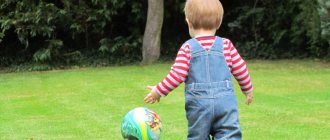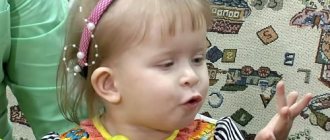Young parents, observing the development of the baby, eagerly wait for him to speak. Sounds appear first, then syllables are formed. Only then do the words appear. The little one is already babbling sweetly in his own language. But it turns out that by this age my friend’s son was naming objects and speaking in phrases. This worries some parents. What to do? Wait for it to “talk”? Should I go to a speech therapist? Let's find out.
The diagnosis of “delayed or impaired speech development” can only be made by a doctor. Neither the experience of friends nor discussions on the forum should become the basis for final conclusions. However, parents should know the main stages of speech development. It is important not to miss the situation when you really need to contact a specialist.
Signs of normal speech development
Speech is a tool of communication. The formation of the speech apparatus is closely related to mental development and the acquisition of life experience. A child learns to speak by copying adults. Mom's songs, jokes, and reciting actions contribute to the development of speech. But cartoons, on the contrary, slow down the process. Children should be involved in dialogue, not just listen or look at pictures.
If a baby hears speech from birth, then by 12 months he will have mastered the following skills:
- Humming is a drawn-out pronunciation of vowel sounds and syllables: ga, ba, ua.
- Babbling is the repeated repetition of one syllable: mamama, bababa, dadada.
- The first words consisting of simple syllables: mom, dad, baba.
- Complex words may appear, pronounced in your own way. Makaya is small, deka is a girl.
A child's active vocabulary should look like this:
- 1.5 years – 20-40 words;
- 2 – 50-200;
- 3 – 800-1000;
- 4 – 1600 – 1900;
- 5 years – 1900-2200.
You need to realize that the concept of norm is relative. But focusing on the speech therapy calendar, it is easier to track how children’s speech development is progressing.
The main questions for a speech therapist: when should a child start talking and how to understand that he needs help
Parents constantly ask questions about their child’s speech development. Why is he silent at three years old, is it necessary to teach him to read as early as possible, is it necessary to pronounce the sound “R”? Nina Polovneva, a speech therapist of the highest category at school No. 45 named after L. I. Milgram, explains in which cases you really need to see a specialist and how to enroll in a speech therapy group.
Useful Mela newsletter twice a week: Tuesday and Friday
SUBSCRIBE
What do speech therapists do besides making sounds?
Over the past 8-10 years, the work of speech therapists has significantly increased. If previously every fourth child on average was “speech impaired” (with speech development disorders), today it is rarely possible to meet at least one preschooler who meets the established standards. It's not just about the notorious "r" and "l". The work of a speech therapist is to increase vocabulary, practice vocabulary, and master grammatical categories. We train visual memory and the ability to analyze information in order to then present it correctly. A speech therapist solves his own problems for different ages, but they are all interconnected.
If in kindergarten a child was never given the sound “s”, and instead of “sledge” he pronounces “shanki”, then in the first grade, most likely, he will make mistakes in writing.
If in preschool age a child is not given a coherent story-monologue based on a picture, then at school difficulties with essays on literature cannot be avoided.
After all, the ability to structure thoughts and move from the general to the specific is laid down during speech therapy classes in kindergarten.
If you don’t teach a child to see the center, foreground and background in a picture, then he will snatch out a small detail (“the bird is flying!”), missing the rest. Subsequently, this can lead to difficulties in analyzing the text and even one’s own reasoning.
How does a child’s speech develop from one to seven years old?
When we talk about what a child should or should not be able to do at a given age, we focus on the concept of “norm”, which so often plunges modern parents into anxiety. On the one hand, their fear that the child will not fit into the established framework of normal development is justified. It is the norm that determines whether a child is ready for school and his future success. But the concept of the norm itself is quite vague, and exceptions to it are quite common.
Everyone has a story about a child they know who didn't speak until he was three and then blurted out an entire sentence at dinner, scaring the whole family and making his mom incredibly happy.
Speech development is very individual, and until the age of three we always give the child time to talk. Unless, of course, his articulatory apparatus is in order and speech development delay is not a consequence of other diseases and injuries.
The speech of a healthy child should develop taking into account these stages (plus or minus six months for each specified age)
- 1 year
- 10-20 words in the passive dictionary (he understands them and can show or at least look at the named object). The active dictionary contains about five or ten short words. - 2 years
- the active vocabulary increases to 100-300 words, simple short sentences and phrases “give the kitty”, “I want a toy”, “the kitty is sitting” appear in speech. - 3 years
- the active dictionary has about 1000 words, and the child can give an adequate answer to the question. - 4 years old
- can correctly repeat a word of four syllables after an adult, has mastered the concepts of “big-small”, “many-little”. - 5 years old
- can repeat a nine-word sentence. Operates with the concepts of “today”, “tomorrow”, “yesterday” - to coordinate times and structure speech. - 6 years
- more than 2,000 words in the active dictionary. At this age, you can teach him to write a story based on a picture - it will come in handy by the first grade. - 7 years old
- an active vocabulary of more than 3,000 words, the child has formed coherent speech, he can retell a read story or a heard story.
These standards form the basis for the requirements for speech development upon admission to school.
How to understand that a child needs a speech therapist?
I always tell parents that speech therapy defects need to be corrected as much as possible before the first grade, because they will already have enough adventures at school. There are, of course, children for whom the distorted sound “r” does not in any way interfere with their studies. They do not have difficulty writing words and their speech is understandable to their interlocutors. In this case, the correct sound setting is a matter of taste and always remains at the discretion of the parents and children themselves. But in most cases, it is important to notice the defect in time and contact a speech therapist, the sooner the better.
You should contact a speech therapist in preschool age if:
- In early childhood, the child does not make sounds, does not hum, or begins to talk until the age of three. Many children skip the period of humming, but it would not be superfluous to see a speech therapist - at least to make sure that everything is in order with the articulatory apparatus.
- A child’s vocabulary does not expand over the years or expands very slowly.
- A preschooler has difficulty remembering the type of letters.
- Poorly or incorrectly pronounces sounds, their combinations, or does not pronounce some of them.
- Has difficulty completing tasks “find the odd one out”, has difficulty summarizing a number of words of one category (cannot answer the question “raspberries, strawberries, currants - what are they?”).
- Stutters.
- By the age of five, he does not begin to “merge” letters into syllables, although he knows how to pronounce them separately.
When a child comes to a speech therapist in kindergarten or at school, the speech therapist must communicate with the parents, look at his medical record and conduct his own examination. First of all, to determine the nature of the violations and the possible causes of these problems. Often speech defects are associated with the fact that children simply were not taught, for example, how to correctly pronounce certain sounds or how to merge them. Then we set them up, work them out and release them.
Unfortunately, in kindergartens and schools, speech therapists do not have the opportunity to ensure that each child also introduces a practiced sound into his speech. It often happens that children are lazy to pronounce correctly, even if they have learned, because their parents already understand them. Therefore, it is important to remember here that sound training should continue at home.
Other speech defects can be caused by both external and internal factors. External factors include the speech environment in which the child grows up, nutrition, ecology, and maxillofacial injuries. Internal ones include a genetic predisposition (the structure of the articulation apparatus can be inherited), birth injuries, and an unfavorable course of the mother’s pregnancy.
If a child does not pronounce certain sounds, say, due to a short frenulum of the tongue or a clumsy tongue, he is prescribed a speech therapy massage.
Massage is not the most pleasant sensation, but still better than cutting the frenulum
In case of surgery, you still need to work with the child for a long time before the desired sound appears. So its effectiveness is in question.
Sometimes speech development disorders are secondary. For example, with mental retardation, mental retardation, traumatic brain injury. In this case, it is necessary to involve a defectologist who is involved in the correction of physical and mental development.
Unfortunately, parents are often so afraid of their own child’s problems that they simply refuse to admit them to themselves and do not listen to the recommendations of specialists. It happens that a child has all the signs of mental retardation, but the mother does not want to believe it. Accordingly, she does not take the necessary steps to take control of the situation in time. The sooner a problem is detected, the greater the chance of working with it effectively.
How can parents themselves help their child?
Talk to your child. Always. From early childhood. Voice your actions, name objects, communicate with him, engage him in dialogue. “Now we’ll go to the kitchen to prepare dinner,” “Look, what a snowstorm it is outside,” “Who came to us?” And so on. Just don’t under any circumstances mince words with the words “who is this here, my haryossy.”
From birth, a child needs to create a literate and clean speech environment.
If he still hasn’t started talking, and his age has already approached, the idea of a family album works great. Create an album or notebook with photographs of relatives and close relatives - those whom the child knows and loves well. You can look at this album with him, point to the people in the photograph and name them. And after a while, ask to see: “Where is Aunt Lyuba? I can’t find something!” If the child starts looking and showing, half the battle is done. He made contact, albeit silently for now.
Then try to complicate things: “So, who do we have here? Completely forgot!". The child may begin to make sounds - joyful, disappointed (if you call Aunt Lyuba Baba Masha), say “Oh!” or try to say the name. Any sound here will be a victory - because it means that the articulatory apparatus is starting to work. Gradually the sounds will become more complex.
Recommended age to visit a specialist
A specialist who works with speech defects is called a children's speech therapist. Observe before making an appointment.
- If you see that a baby under one year old understands speech addressed to him, hums, and babbles in response, development is proceeding correctly.
- At 1.5-2 years old, phrases and simple sentences appear.
- At 2-3 – the little person actively communicates with peers, enriching his vocabulary.
- At 3, he masters whistling sounds, and at 4, hissing sounds.
- The pronunciation of complex R and L is established at 5-6 years.
- A child over 6 speaks words clearly, constructs sentences freely, and composes a story.
If you notice any deviations, consult a specialist. It makes sense to go to a speech therapist no earlier than 2 years. Be sure to visit your doctor before school.
Let us consider the features of speech development in preschoolers in more detail.
1 YEAR
From one to two years the baby masters about 20-60 words. They have the meaning of sentences: they name objects, people or actions (mother, give, na). The baby learns complex words, which he names in his own way: “mako” - milk. Speech therapists say not to correct mistakes, but to correctly name the desired object themselves, repeating after the child. For example: “What will you drink? Milk?".
2 YEARS
From 2 to 3, speech improves noticeably. Simple words are replaced by complex ones. Children begin to use sentences consisting of several words. The baby is more often asked questions: “Why?”, “Where?”. Adjectives, prepositions, and conjunctions appear. Speech becomes expressive and grammatically correct. Slurred pronunciation may persist. The baby skips letters or switches syllables. He speaks sometimes correctly, sometimes incorrectly, and sometimes prefers to remain silent altogether.
3 YEARS
From 3 to 4 years old, children's active vocabulary becomes more extensive. By this age, kindergarten or development school occurs, and communication with peers is added.
New sounds appear that the baby could not pronounce correctly before. The child learns to use verbs and adjectives. Agrees them with nouns. Skillfully uses pronouns, knows the concept of gender and number. By the age of 4, children master general terms: dishes, clothes, animals. They can give an assessment: good, beautiful, clean. Able to notice errors in pronunciation among peers.
4 YEARS
From 4 to 5 years of age, speech continues to improve. The four-year-old speaks coherently and is able to tell a short story. The words in the sentence agree almost without errors. There may be difficulty forming plurals. For example: pencil - pencils, mirror - mirrors. If an adult suggests the correct option, the baby will easily remember. Children begin to “play” with sounds. They come up with rhymes, sing songs, learn poems. Able to remember and correctly say last name, first name, patronymic. By the age of five, children actively communicate, speech development is in full swing.
5 YEARS
At the age of 5-6 years, a qualitative leap in development occurs. Children are able to tell not only stories from life, but also retell short stories and describe pictures. There are fewer mistakes, and more complex words and sentences. It turns out to pronounce R and L - the most difficult sounds. Sound pronunciation is clear and correct.
6 YEARS
By the age of six, the speech apparatus is almost completely formed. Children are preparing for school, where they will have to master reading and writing. At this age, parents are required to pay close attention to speech. The child must speak coherently and clearly. If speech defects are observed, it is necessary to bring the baby to a speech therapist.
Is it possible to contact a speech therapist online?
Speech therapists have long and successfully worked online with children from abroad who live in a different language environment, and they need to be taught the correct pronunciation of the sounds of the Russian language. But in recent months, our compatriots have also been actively seeking online consultations. An online consultation with a speech therapist allows you to protect yourself from unnecessary contacts and saves time and effort. But it is necessary to carry out preliminary work with the child and prepare for the lesson technically. If the speech therapist sees that for some reason the child is not ready to study online, he will definitely inform the parent about this.
What are the features of online classes?
The main difference between online and face-to-face consultations is the increased role of the parent. He becomes a link between the speech therapist and the child. From a specialist’s point of view, this is a huge plus. First, a parent who is involved has a better understanding of what is happening and can more quickly evaluate the outcome. Secondly, it is easier for him to do homework with the child. And homework is a must! A specialist will identify the problem and give exercises, but you won’t be able to improve your speech by studying once or twice a week.
How does an online consultation work?
An online appointment with a speech therapist is almost no different from an in-person appointment. In both cases, the same speech therapy diagnostic technique is used, with which speech development can be assessed.
The consultation begins with establishing contact with the child. I talk to him, ask questions about his immediate circle. Then the child receives tasks and instructions on how to complete them. They are necessarily accompanied by illustrations.
At the end of the lesson, I communicate with the parent, tell him about the peculiarities of the child’s speech development, and answer questions.
Start working with a speech therapist for free
Memo for parents
To get your child talking, you need to follow the advice of experts.
- Be an example. Speak correctly, legibly, call things by their proper names. Enrich your vocabulary. Don't be afraid to use difficult words, but don't forget to explain their meaning.
- Do not overuse the pacifier.
- If the baby prefers to remain silent, although he can explain himself in words, stop understanding gestures and facial expressions for a while. Follow the request if the child uses speech.
- Avoid baby words, especially if the child is over 2 years old. Let it be better to have a car than a Bibika. The baby will quickly master the correct pronunciation.
- Correct mistakes gently. Don't scold for incorrect pronunciation, don't tease, don't laugh.
If you see a significant violation of speech development, contact a speech therapist. The specialist will invite you to a speech therapy session or tell you how to practice on your own at home. Speech development classes are also held in kindergartens.
At what age is it time to see a speech therapist?
It is difficult to name the exact age, because a child’s speech does not appear suddenly; it is a process extended over time. Each stage of speech development has its own characteristics and signs, which the specialist focuses on during diagnosis. For example, in infancy, such a sign may be the absence of humming and babbling.
There is no age at which it is too late to contact a speech therapist. Remember the film "The King's Speech", which tells the true story of King George VI of Great Britain. He began working with a speech therapist as an adult, when he received his rights to the throne, in order to get rid of his stuttering and learn to speak beautifully. The only question is the amount of time and effort that will have to be spent. For example, it is easier to correct a throat “r” at six years old than at 12. But if you practice regularly, you will definitely get results.
Speech therapist consultation for parents








